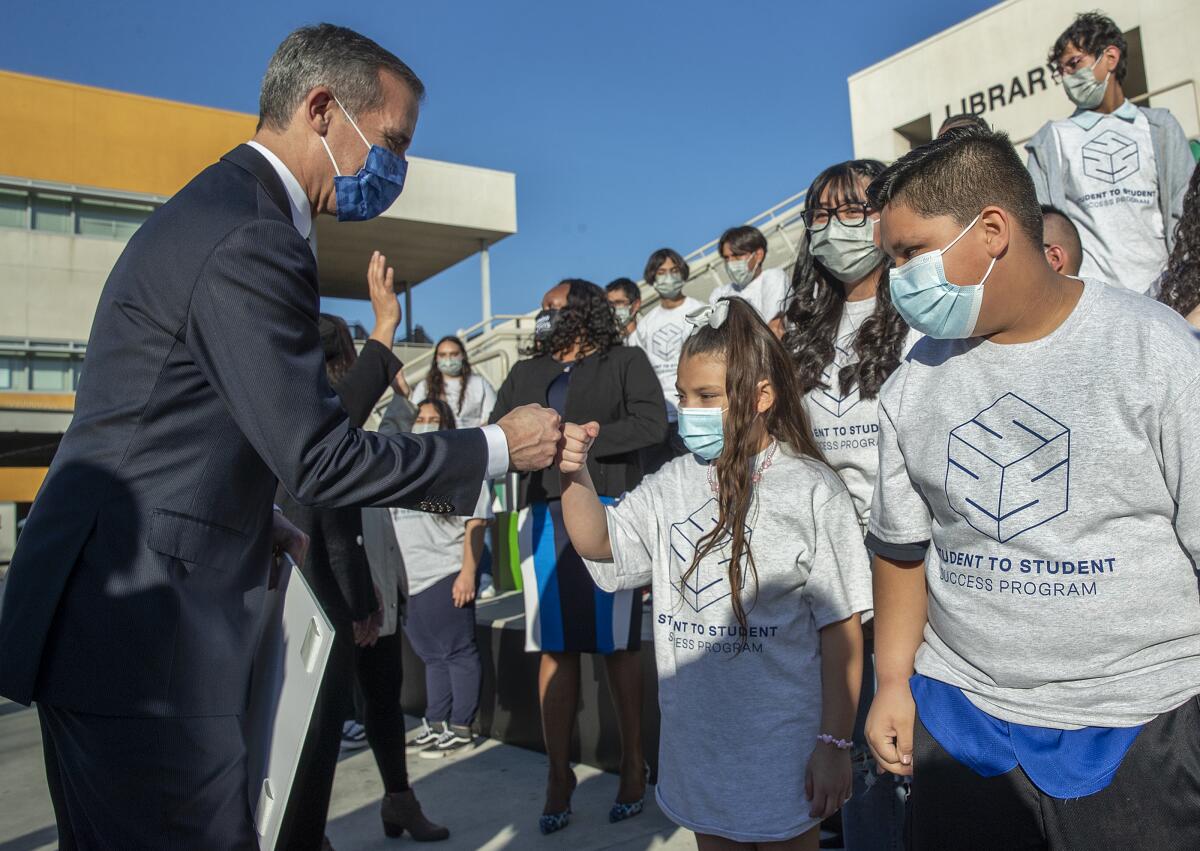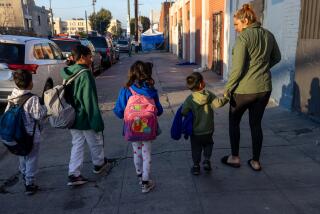Los Angeles to receive $53 million as part of California’s new youth jobs program

- Share via
Los Angeles County will receive $53 million as part of a $185-million statewide program aimed at increasing youth employment in underserved communities, helping improve those neighborhoods and assisting in forging career paths for participants.
The California for All Youth Jobs Corps program is primarily intended to reach young adults who are low-income, transitioning out of foster care, formerly incarcerated or those within mental health or substance abuse care systems, officials said. Program funding was included in Gov. Gavin Newsom’s 2021-22 “California Comeback Plan.”
The two-year program, announced during a virtual news conference Thursday that included L.A. Mayor Eric Garcetti, aims to generate work opportunities for people between the ages of 16 and 30, while addressing major issues such as climate change, food insecurity, and COVID-19 recovery. The program’s first phase will make $150 million available to 13 large cities and the second phase will make $35 million available to smaller counties and cities selected through a competitive process.
Cities that are expected to receive funding once grant contracts are signed include Los Angeles, San Diego, San Jose, San Francisco, Fresno, Sacramento, Long Beach, Oakland, Bakersfield, Anaheim, Santa Ana, Riverside and Stockton. The state plans to release its second round of funding for smaller cities and counties to serve unincorporated areas sometime in March.
“This program will allow underserved youth to find employment, gain valuable job skills and give back to their communities to build an ethic of public service,” Josh Fryday, the state’s chief service officer, said during the online briefing.
The program builds on a long history of federal and state-funded work programs that specifically encourage underserved youth to work in public sector jobs, starting with the federally funded Neighborhood Youth Corps programs in the 1960s, officials said.
Under the state’s new program, Fryday said jobs in Los Angeles will include maintenance of the Los Angeles River, assistance at food banks, tutoring for students whose learning was affected by the pandemic and planting new trees in poorer neighborhoods that bear the brunt of extreme heat during the summer.
Other cities such as Riverside and Fresno will offer more technical jobs such as data technicians and accounting clerks, officials said.
The jobs range from summer programs to yearlong positions, paying a minimum of $15 an hour. But cities will be allowed to adjust pay based on need. Fryday said some cities are paying as much $27 an hour for positions.
“The hope is to create real onramps to careers and long-term jobs,” Fryday said.
Whether or not such youth work programs actually lead to long-term success for its participants is a contested issue among workforce experts.
Evaluations of such programs since the 1960s showed that there were no dramatic differences in income gains or employment between participants and people who did not participate in the programs, said Michael Bernick, an employment attorney and former head of the state’s labor department.
However, Bernick pointed out that programs like the state’s provide other positive impacts, such as building work experience that could prove important when looking for future employment.
A 2018 study conducted by researchers at California State University, Northridge looked at a similar youth work program ran by the county and city. Comparing participants and nonparticipants, the study showed participants walked away with a clearer sense of their self-management and communication skills, more knowledge of the labor market and increased enrollment in school.
But Bernick has seen less successful programs: ones where participants lacked proper supervision, were given jobs that didn’t give real work experience, weren’t kept busy and not given clear tasks.
“Whether the program is effective or not will depend on how it is carried out, whether youth are engaged in purposeful activities, properly supervised and are expected and given the opportunity to provide a real service,” Bernick said. “A lack of real work has been a shortcoming in some of the previous public sector job creation programs.”
The program will give cities a lot of discretion with how and where the money will be used in meeting the state’s main goals. Fresno plans to focus on young people who are former gang members. Santa Ana is focusing on formerly incarcerated youth. San Francisco is looking to find applicants from public housing residents.
Each quarter, cities must show the governor’s office and lawmakers how they are using the funds and meeting their program goals, Fryday said.
The state’s new program will provide participants with career services like resume preparation and job training.
More to Read
Sign up for Essential California
The most important California stories and recommendations in your inbox every morning.
You may occasionally receive promotional content from the Los Angeles Times.











